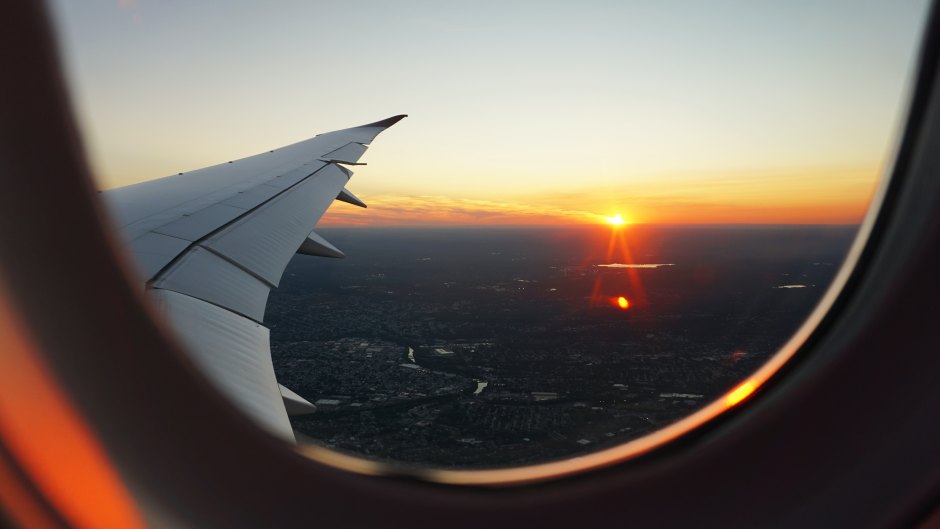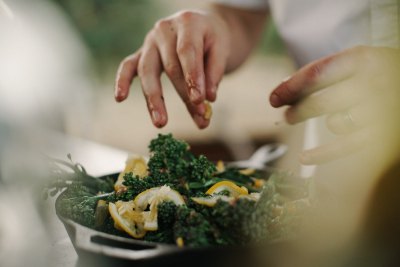
Unsplash
Tips to Eat Healthy While Traveling
In Touch has affiliate partnerships so we may receive compensation for some links to products and services.
Maintaining a healthy diet while traveling seems next to impossible, doesn’t it? Whether you are on the road for work or pleasure, the temptation to eat junk can be a struggle because most of us will just wander into a fast food joint and eat what’s quick. The struggle to eat healthy food is real. The good news is that you don’t have to worry about it. Here are nine easy hacks for eating healthy while traveling that will promote a balanced diet and keep you healthy!
Stay Hydrated With Plenty of Water
One of the most basic elements of eating healthy while traveling is staying hydrated. The symptoms of dehydration sometimes mask themselves as hunger, so the reason your stomach starts rumbling might not be hunger but dehydration. It is quite common for the air inside airplanes to be quite dry, which can actually cause dehydration. “Carrying a refillable water bottle can help you stay hydrated while traveling and reduce your desire to snack,” says Natalia Morozova, Partner at Cohen, Tucker & Ades P.C.. “While you can’t bring water or any other liquids with you through security, you can bring an empty bottle. Simply fill it up on your way to boarding after screening.” Get in the habit of filling it (and drinking!)
Pack Your Own Snacks
During travel, long flights and layovers may lead to more hunger. Airport food kiosks, gas stations, and other on-the-go options are geared for convenience, not your health. Bringing your own healthy foods will save you time, money, and your well-being. Michael Ayjian, Co-Founder and Executive Producer at 7 Wonders Cinema tells us, “Having a box of healthy snacks like nuts, dried fruits, and seeds will come in handy. They are rich in fiber and keep you full for longer, so you won’t feel the need to binge on junk food.” These days, food is allowed in all forms of transportation, be it aircraft, buses, or trains. Therefore, packing food for your journey shouldn’t be a problem.
Minimize Caffeine Intake
Minimizing one’s caffeine intake is crucial for maintaining a healthy lifestyle. Coffee often makes you dehydrated, and it could result in a caffeine crash. Additionally, sugary beverages have a negative impact on the body, particularly when traveling. “Try to keep a supply of green tea bags or other kinds of herbal tea bags with you. Ask for boiling water and make your own tea instead of asking for a cup of joe,” suggests Ryan Azimi, Director of International Development at ETIAS. “This way, you will stay hydrated, and it will pay off in the long run.”
Never Skip Breakfast
It’s not unusual for people to skip meals, especially when they’re busy. The majority of the time, it happens while traveling. Drew Sherman, Director of Marketing and Communications at Carvaygo explains, “It’s important to understand the health implications of skipping meals, such as higher diabetes risk, slower metabolism, binge eating, weight gain, and so on.” Breakfast is often considered the most important meal of the day. Having a good breakfast that is high in protein will help you balance your blood sugar level throughout the day. Whenever possible, choose fresh fruit or yogurt over sugary carbs.
Control Portion Sizes
Vacations are a great time to indulge in your favorite foods and satisfy your cravings. You can, however, reduce the portion to avoid wrecking your diet. The best thing to do is to start slowly. Choose a half sandwich instead of a full, eat fewer spoonfuls, and order grilled instead of fried. By doing this, you can cut unwanted calories from your daily diet and stay healthy at the same time. Eat until you are full, do not push yourself to eat more than you need to. “Eating mindfully prevents overeating, as it allows your brain and stomach to communicate when you become full,” says Karim Hachem, VP of eCommerce at La Blanca. “It can also allow you to digest food better, maintain a feeling of fullness with less food, and help you make better food choices in the future.”
Cook Your Own Meals

There are a number of vacation rentals and Airbnbs, and even hotels that are equipped with modern kitchen facilities. The most economical way to eat healthy while traveling is to make your own food. You can save money and eat healthier by buying your own groceries and cooking yourself. “When you’re traveling, the fewer ingredients, the better. Choose from eggs, meat, or pasta as your base,” states Shaunak Amin, CEO and Co-Founder of SwagMagic. “For instance, by adding chopped vegetables and a splash of hot sauce, two eggs can be turned into an omelet or frittata.” If your new accommodation doesn’t have a kitchen, use Google Maps to search for healthy eating options nearby.
Incorporate Lean Protein Into Your Diet
Whether driving long distances, going to the beach, or attending a long meeting, make sure to have lean protein-rich meals. Having too little protein on the go may leave you tired and lethargic. Due to this, it is imperative to consume balanced meals throughout the day while traveling. Kevin Callahan, Co-Founder and CEO of Flatline Van Co. tells us, “A plate full of veggies, whole grain salad, and poached eggs can provide a healthy dose of lean protein. In case you need something quick on the go, opt for a high-quality protein bar or beef jerky.”
Consider Taking a Probiotic
When you are traveling and eating out a lot, it is a good idea to incorporate probiotics into your diet. Furthermore, travel exposes the body to bacteria and germs that can negatively affect the immune system. In addition to keeping gut health in check, it improves digestion and immunity. Bill Glaser, CEO of Outstanding Foods tells us, “Taking a supplement will be the easiest way to obtain probiotics since most strains need refrigeration to survive.” You can find probiotics in fermented foods like yogurt, kombucha, sauerkraut, pickles, tempeh, kimchi, sourdough bread, pickles, kombucha, sauerkraut, sauerkraut, pickles, and some cheeses.
<2>Limit Your Alcohol Intake
Having a glass of wine or two on vacation can be a pleasant way to socialize and relax, but drinking when traveling can pose unforeseen risks. Alcohol consumption often leads to bloating and hangovers. Consequently, it has disastrous effects on a balanced diet. In addition, most cocktails and alcohol contain a lot of sugar, which converts into fat in the body. By consuming stiff drinks, your body will become dehydrated and lose energy. Brett Estep, COO of Insured Nomads says, “A good rule of thumb is to have a non-alcoholic beverage for every alcoholic beverage you drink, preferably water. Also, avoid exceeding more than two drinks in a 3-hour period.”
Final Thoughts
Keeping healthy while traveling can seem challenging, but it is definitely possible. Woody Sears, Founder of Autio reminds us, ” Since travel often involves eating out, the best way to stay on track with a healthy diet is to make a plan in advance.” By following these tips, you’ll be able to enjoy your trip while still staying on track. With a little planning and self-discipline, you can return from your travels feeling refreshed and rejuvenated.
Have a tip? Send it to us! Email In Touch at contact@intouchweekly.com.





































